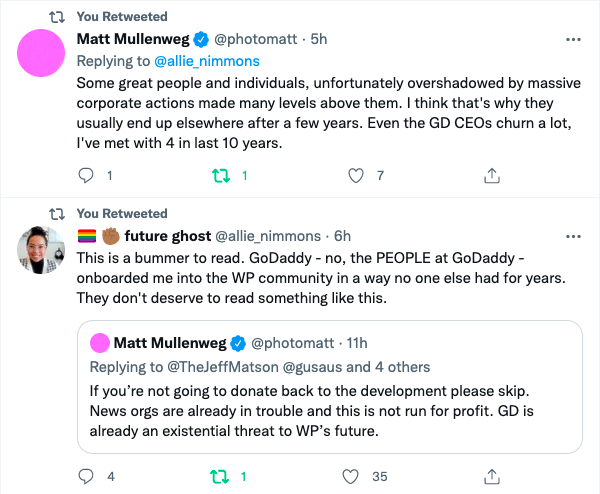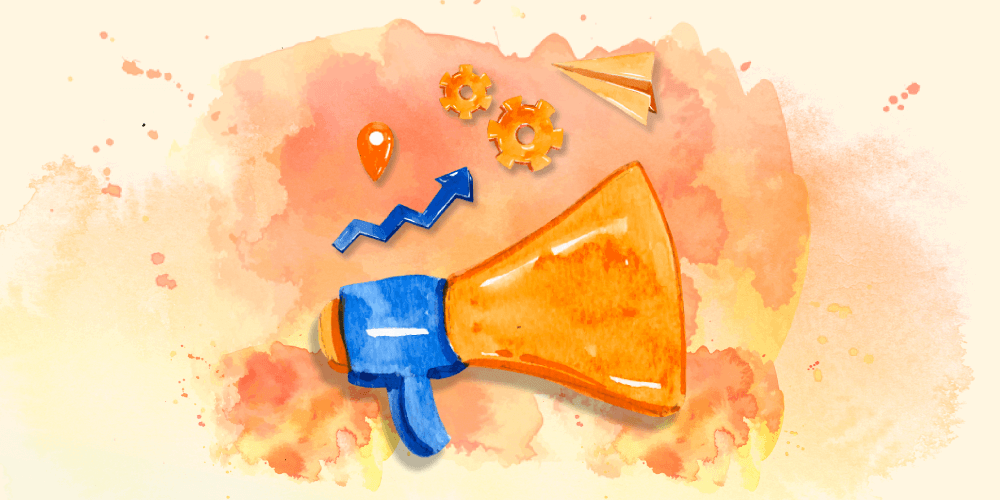Today, WordPress co-founder and Automattic founder Matt Mullenweg criticized GoDaddy, the web host and domain registrar, for what he described as its lack of participation in the WordPress project. Here’s a quick recap of some of what Mullenweg said, which was split across a number of tweets and threads throughout the day.
Update: This evening, about 11 hours after the first tweet on this topic, Mullenweg deleted many of the tweets cited in this article.
“GD [GoDaddy] is already an existential threat to WP’s future.”
“What I’m worried about is the future of WordPress if GoDaddy succeeds and suffocates the rest of the ecosystem.”
“If Godaddy, which already claims to be the largest WP host in the world since 2019, succeeds in taking customers from Newfold, WP Engine, Automattic, would WordPress still thrive? Would it even survive?”
“If you work at Godaddy, just look at the org chart. How many people are contributing to WP, Woo, etc., vs. working on the proprietary website and store products? How much [does] GD put back into .org [open-source WordPress] vs. spend on cPanel licenses?”
“[quoting a GoDaddy news release] ‘nearly a quarter of our Managed WordPress customers with commerce enabled have adopted GoDaddy Payments over well-known competitors.’ If that goes to 100%, guess what, WooCommerce dies on the vine.”
And in response to a tweet from Allie Nimmons, my colleague here at MasterWP, Mullenweg added:
“Some great people and individuals, unfortunately overshadowed by massive corporate actions made many levels above them. I think that’s why they usually end up elsewhere after a few years. Even the GD CEOs churn a lot, I’ve met with 4 in last 10 years.”

Some community members commented that there is a history of Mullenweg leveling similar statements against large web hosts. Today, he contrasted GoDaddy with Bluehost (now owned by Newfold Digital), which he says has provided “tons of support across the ecosystem” throughout the life of the WordPress project.
[midroll_1]
Needless to say, today’s discussion brings up some significant questions about where GoDaddy fits into the WordPress ecosystem, as well as the degree to which Mullenweg and Automattic see competition with their core products as acceptable in the absence of contributions to the open-source project. For example, he calls out GoDaddy for selling a “GoDaddy Payments” payment processor that competes with similar products from WooCommerce (which Automattic owns). Here’s a bit more on that element of the business from Carl Hancock, the founder of Gravity Forms:
I’ve never considered GoDaddy to be a high-end company – I recommend hosts like WP Engine over GoDaddy hosting to my clients – but I do appreciate some of the products they’ve acquired, most notably ManageWP, which I use every day. They’re a continuous presence in the WordPress ecosystem. (They are not a sponsor of MasterWP, so no sponsorship disclaimer here!) I’ve always viewed them as basically a “big box store” type of company – they compete on price and offer no-frills products. Mullenweg believes they should give more back to the WordPress community, since a lot of their success comes from hosting WordPress sites. But they’re not really in that mindset, because they’re a giant company focused on eking out margins on inexpensive products and services. And so, we have a conflict between two different business styles.
Of GoDaddy’s approach to business, Mullenweg says:
“There’s no rule in business that says you have to do the right thing, contribute to society, or account for the externalities of your actions.”
From discussing this with colleagues today, I ended up with a few takeaways.
[midroll_2]
First, if you fear that your business model is going to be suffocated by GoDaddy, which I see as a very large company offering lower-end products and services at rock-bottom prices, I think you should consider a new business model. This is one of the challenges of running a hosting business – it’s a shark-infested red ocean with limited opportunity to differentiate, so you end up in a race to the bottom on pricing and you get squeezed out. The fact that WordPress.com is operating on the same business model as other web hosts means that it faces an existential risk from any other web host who chooses to play hardball against it.
The competition from GoDaddy Payments seems similar to me – basically GoDaddy is making a play for lots of users at a very low price point in the hopes of shaving off a fraction of a percent of each future transaction from their e-commerce customers, and thus competing against WooCommerce (which apparently does something similar via its partnerships with Stripe, PayPal and Square). This is a classic race to the bottom, because if you want those payment processing fees, the economically rational thing to do is make hosting free in order to get more people using your payments processor. At a certain point you can even justify paying people to sign up, as PayPal did when it was in its early years. Obviously these are dangerous waters when you have competitors with very deep pockets.
I am not sure how effective it will be to guilt a company into contributing more. There seems to be agreement that lots of great people who genuinely care about WordPress work for GoDaddy, but Mullenweg says they are hamstrung by restrictions on how much they can contribute. That said, not every business endorses or cares about the future of open-source software. If GoDaddy’s higher-ups don’t care, and if we want to avoid them “suffocating” other companies that contribute more, it would be more productive to outcompete them instead of simply being publicly upset about the presence of competition.
Finally, I think Mullenweg overestimates the risk of “suffocation.” If Automattic ceased to exist tomorrow, thousands of people would fill in the gaps to keep the WordPress community going. My company and hundreds of others would put time, energy and money into making the software stronger. It’s great that cash is flowing into the ecosystem via WooCommerce and other popular tools, but open-source is bigger than any one person or company. We can all work together toward a better future, and I’m skeptical that any tech behemoth – GoDaddy or otherwise – will stop us.


